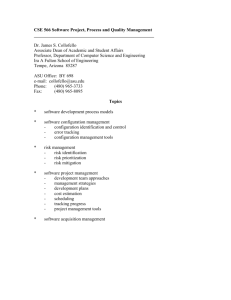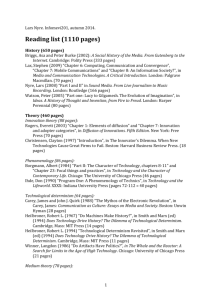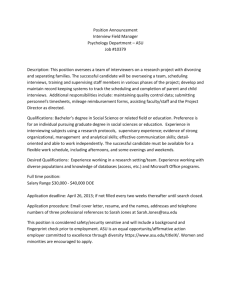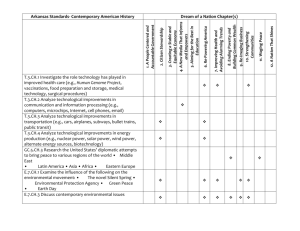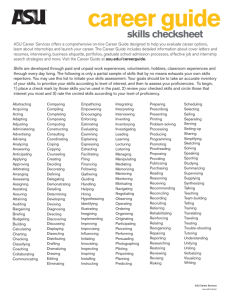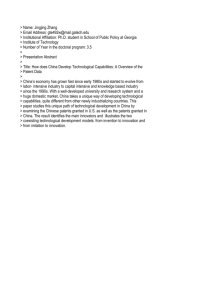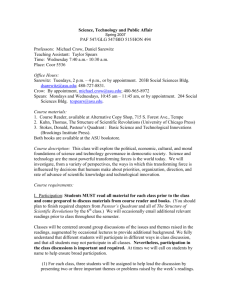Introduction to Analyzing Sociotechnical Systems
advertisement
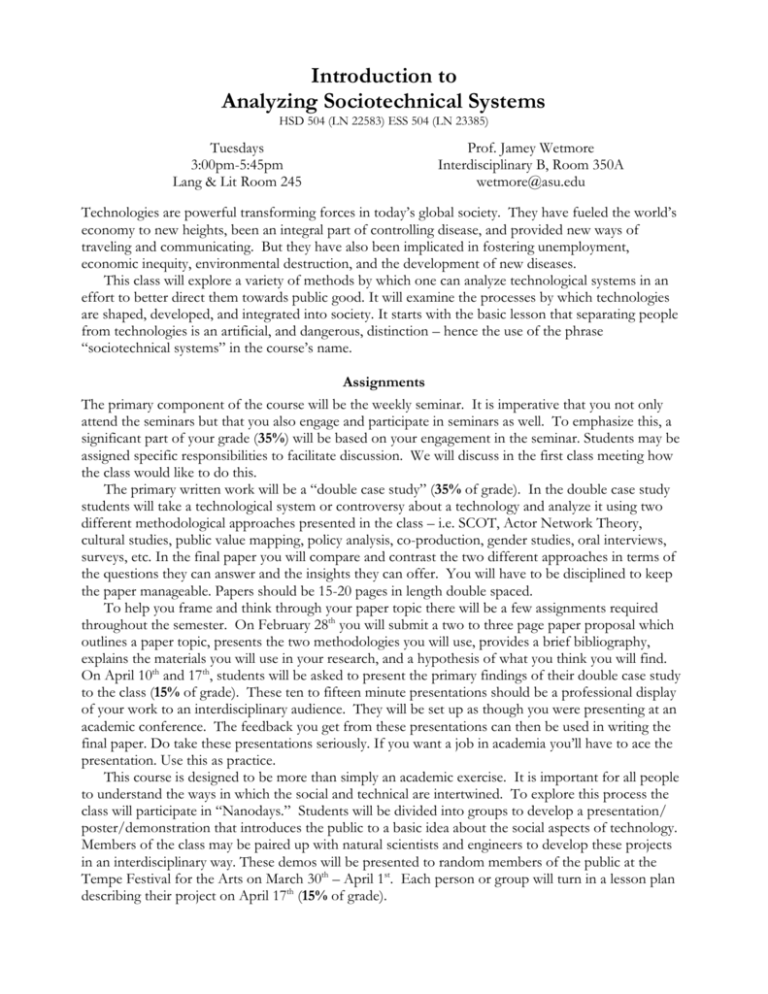
Introduction to Analyzing Sociotechnical Systems HSD 504 (LN 22583) ESS 504 (LN 23385) Tuesdays 3:00pm-5:45pm Lang & Lit Room 245 Prof. Jamey Wetmore Interdisciplinary B, Room 350A wetmore@asu.edu Technologies are powerful transforming forces in today’s global society. They have fueled the world’s economy to new heights, been an integral part of controlling disease, and provided new ways of traveling and communicating. But they have also been implicated in fostering unemployment, economic inequity, environmental destruction, and the development of new diseases. This class will explore a variety of methods by which one can analyze technological systems in an effort to better direct them towards public good. It will examine the processes by which technologies are shaped, developed, and integrated into society. It starts with the basic lesson that separating people from technologies is an artificial, and dangerous, distinction – hence the use of the phrase “sociotechnical systems” in the course’s name. Assignments The primary component of the course will be the weekly seminar. It is imperative that you not only attend the seminars but that you also engage and participate in seminars as well. To emphasize this, a significant part of your grade (35%) will be based on your engagement in the seminar. Students may be assigned specific responsibilities to facilitate discussion. We will discuss in the first class meeting how the class would like to do this. The primary written work will be a “double case study” (35% of grade). In the double case study students will take a technological system or controversy about a technology and analyze it using two different methodological approaches presented in the class – i.e. SCOT, Actor Network Theory, cultural studies, public value mapping, policy analysis, co-production, gender studies, oral interviews, surveys, etc. In the final paper you will compare and contrast the two different approaches in terms of the questions they can answer and the insights they can offer. You will have to be disciplined to keep the paper manageable. Papers should be 15-20 pages in length double spaced. To help you frame and think through your paper topic there will be a few assignments required throughout the semester. On February 28th you will submit a two to three page paper proposal which outlines a paper topic, presents the two methodologies you will use, provides a brief bibliography, explains the materials you will use in your research, and a hypothesis of what you think you will find. On April 10th and 17th, students will be asked to present the primary findings of their double case study to the class (15% of grade). These ten to fifteen minute presentations should be a professional display of your work to an interdisciplinary audience. They will be set up as though you were presenting at an academic conference. The feedback you get from these presentations can then be used in writing the final paper. Do take these presentations seriously. If you want a job in academia you’ll have to ace the presentation. Use this as practice. This course is designed to be more than simply an academic exercise. It is important for all people to understand the ways in which the social and technical are intertwined. To explore this process the class will participate in “Nanodays.” Students will be divided into groups to develop a presentation/ poster/demonstration that introduces the public to a basic idea about the social aspects of technology. Members of the class may be paired up with natural scientists and engineers to develop these projects in an interdisciplinary way. These demos will be presented to random members of the public at the Tempe Festival for the Arts on March 30th – April 1st. Each person or group will turn in a lesson plan describing their project on April 17th (15% of grade). Course Schedule January 10th – Introduction – Technology, Progress, and Social Change General Motor’s Futurama Exhibit at the New York World’s Fair (1939) January 17th – Why study technology? Westinghouse, “The Middleton Family at the New York World’s Fair,” 1939, available from Prelinger Archives and many places online (approx. 55 minutes long). Robert L. Heilbroner, “Do Machines Make History?” Technology and Culture, Volume 8, No. 3, July 1967, pp. 335-345. Leo Marx, “Does Technology Mean Progress?” Technology Review, January 1987, pp. 33-41. “Industrial Society and its Future” – excerpts Frames and Claims Presentations January 24th – Social Construction of Technological Systems (SCOT) Trevor Pinch and Wiebe Bijker, “The Social Construction of Facts and Artifacts: or how the Sociology of Science and the Sociology of Technology Might Benefit Each Other,” in W.E. Bijker, T.P. Hughes, and T. Pinch, The Social Construction of Technological Systems, New Direction in the Sociology and History of Technology, The MIT Press, 1987. Ronald Kline and Trevor Pinch, “Users as Agents of Technological Change: The Social Construction of the automobile in Rural United States, Technology and Culture, Oct 1996, pp. 763-795. Nelly Oudshoorn, “Clinical Trials as a Cultural Niche in Which to Configure the Gender Idnetities of Users: The Case of Male Contraceptive Development,” in Nelly Oudshoorn and Trevor Pinch, How Users Matter: The Co-Construction of Users and Technology (MIT Press, 2005), pp. 209-227. January 31st – Actor Network Theory Michel Callon, “Some elements of a sociology of translation: domestication of the scallops and the fishermen of St. Brieuc Bay,” in John Law, Power, action, and belief: a new sociology of knowledge? London, Routledge, 1986, pp. 196-223. John Law, Technology and Heterogeneous Engineering: The Case of Portuguese Expansion,” in W.E. Bijker, T.P. Hughes, and T. Pinch, The Social Construction of Technological Systems, New Direction in the Sociology and History of Technology, The MIT Press, 1987. Bruno Latour, “Where Are the Missing Masses? The Sociology of a Few Mundane Artifacts,” in W.E. Bijker and J. Law (eds.), Shaping Technology/Building Society: Studies in Sociotechnical Change (Cambridge, Mass.: MIT Press, 1992), pp. 225–258. February 7th – Technological Momentum and Co-production Thomas P. Hughes, “Technological Momentum,” in Leo Marx and Merritt Roe Smith (eds.), Does Technology Drive History? The Dilemma of Technological Determinism (Cambridge, Mass.: The MIT Press, 1994), pp. 101113. Sheila Jasanoff, “Ordering Knowledge, Ordering Society,” in Sheila Jasnaoff (ed.) States of Knowledge: The CoProduction of Science and Social Order (New York: Routledge, 2003), pp. 13-45. Donald MacKenzie, “Nuclear Missile Testing and the Social Construction of Accuracy,” in Mario Biagioli (ed.), The Science Studies Reader (New York: Routledge, 1999), pp. 342 – 357. February 14th – Feminist Critiques of Technology Judy Wajcman, “Feminist Critiques of Science and Technology,” Feminism Confronts Technology, pp. 1-26. Judy Wajcman, “Reproductive Technology: Delivered into Men’s Hands,” Feminism Confronts Technology, pp. 54-80. Donna Haraway, “A Cyborg Manifesto: Science, Technology, and Socialist-Feminism in the Late Twentieth Century,” in Simians, Cyborgs and women: The Reinvention of Nature (New York, Routledge, 1991), 149-181. Rachel N. Weber, “Manufacturing Gender in Commercial and Military Cockpit Design,” Science, Technology, & Human Values, Vol. 22, No. 2, Spring 1997, pp. 235-253. February 21st – Technology and Race Charles B. Dew, Bond of Iron: Master and Slave at Buffalo Forge, W.W. Norton & Company, 1994, introduction, chps. I-1, II-1, II-6. Richard Dyer, White (New York: Routledge, 1997), pp.83-94. Ray Fouche, “Say it Loud, I’m Black and I’m Proud: African Americans, American Artifactual Culture, and Black Vernacular Technological Creativity,” American Quarterly 58.3 (2006) pp. 639-661. February 28th – Cultural Studies of Technology David E. Nye, Electrifying America: Social meanings of a New Technology, 1880-1940, The MIT Press, 1990, Preface, Ch 1, Ch 2, Ch 6, Ch 8, Ch 17, conclusions. Spencer Weart, Nuclear Fear: A History of Images, Harvard University Press, 1988, Preface, Ch 1, Ch 3. Dual Case study proposal due March 6th – Ethnographies and Interviewing Techniques Sherry Turkle, The Inner History of Devices, Introduction, pp. 2-29. Dominique Vinck, “Socio-Technical Complexity: Redesigning a Shielding Wall,” In Dominique Vinck, ed., Everyday Engineering: An Ethnography of Design and Innovation (Cambridge, Mass.: The MIT Press, 2003), pp. 13-27. Jameson M. Wetmore, “Amish Technology: Reinforcing Values, Building Community,” IEEE’s Technology & Society Magazine 26(2), June 2007, pp. 10-21. March 13th – Technological Literacy Greg Pearson and A. Thomas Young (eds.), Executive Summary, Technically Speaking: Why all Americans need to know more about technology (Washington, DC: National Academies Press, 2002). [The entire short book is available for free on the NAP website.] Larry Bell, “Engaging the Public in Technology Policy,” Science Communication 29:3, pp. 386-398. Laura Martin, “Arizona Science Center’s Public Presentation Introduction Guide.” March 20th – Celebrate Spring Break! March 27th – Science Fiction as a tool for thinking about the future Clark Miller and Ira Bennett, “Thinking Longer Term about Technology: Is there value in Science FictionInspired Approaches to Constructing Futures,” Science and Public Policy 35(8), pp. 597-606. Stellan Welin, “Reproductive Ectogenesis: The third era of human reproduction and some moral consequences,” Science and Engineering Ethics, Vol. 10, No. 4, October 2004, pp. 615-626. Science Fiction book or movie… maybe Charles Stross’s Rule 34, Cruise/Spielberg’s Minority Report, or Neal Blomkamp’s District 9? March 30th – April 1st – Nanodays Presentation at Tempe Festival of the Arts April 3rd – Technological Disruptions Charles Perrow, Normal Accidents: Living with High Risk Technologies, Introduction and Chapter 1, pp. 3-31 (Princeton University Press, 1999). Thomas F. Gieryn and Anne E. Figert, “Ingredients for a theory of science in society: O-rings, ice water, cclamps, Richard Feynman and the Press,” in Susan Cozzens and Thomas Gieryn, Theories of Science in Society (Bloomington, IN: Indiana University Press, 1991), pp. 67-97. L. Srivastava, “Mobile Phones and the evolution of social behavior,” Behavior & Information Technology, 24:2, 2005, pp. 111-129. April 10th – Student Presentations April 17th – Student Presentations / Student Choice of topic Nanodays lesson plan due April 24th – Student Choice of topic Dual Case study due Other Course Matters… Incompletes A mark of "I" (incomplete) is given by the instructor when you are otherwise doing acceptable work but are unable to complete the course because of illness or other conditions beyond your control. You are required to arrange with the instructor for the completion of the course requirements. The arrangement must be recorded on the Request for Grade of Incomplete form (http://students.asu.edu/forms/incomplete-grade-request). Students who do not make such arrangements will be given the grade earned based on the assignments completed. Late Assignments The due date for each assignment is listed on the course schedule. One third of a letter grade will be deducted for every day the assignment is late unless alternative arrangements have been made with the professor. Excuses for turning an assignment in late must be made and approved in advance of the due date of the assignment. Requests for excuses must be written, either on paper or email, and approval must be obtained, either by an email reply or by having the paper excuse signed. In order to avoid a late penalty, the late assignment must be submitted with a copy of the email approval or signed written excuse. Student Standards Students are required to read and act in accordance with university and Arizona Board of Regents policies, including the ABOR Code of Conduct: Arizona Board of Regents Policies 5-301 through 5-308: http://www.abor.asu.edu/1_the_regents/policymanual/chap5/5Section_C.pdf Academic Integrity All students are responsible for reviewing and following ASU’s policies on academic integrity: http://provost.asu.edu/academicintegrity. If you fail to meet the standards of academic integrity in any of the criteria listed on the university policy website, sanctions will be imposed by the instructor, school, and/or dean. Academic dishonesty includes borrowing ideas without proper citation, copying others’ work (including information posted on the internet), and failing to turn in your own work for group projects. Please be aware that if you follow an argument closely, even if it is not directly quoted, you must provide a citation to the publication, including the author, date and page number. If you directly quote a source, you must use quotation marks and provide the same sort of citation for each quoted sentence or phrase. You may work with other students on assignments, however, all writing that you turn in must be done independently. If you have any doubt about whether the form of cooperation you contemplate is acceptable, ask the TA or the instructor in advance of turning in an assignment. Please be aware that the work of all students submitted electronically can be scanned using SafeAssignment, which compares them against everything posted on the internet, online article/paper databases, newspapers and magazines, and papers submitted by other students. Student Support and Disability Accommodations ASU offers support services through Counseling (http://students.asu.edu/counseling), the Learning Resources Center (www.asu.edu/lrc), and the Disability Resource Center (http://www.asu.edu/studentaffairs/ed/drc/). If you are a student in need of special arrangements for we will do all we can to help, based on the recommendations of these services. For the sake of equity for all students, we cannot make any accommodations without formal guidance from these services. This syllabus is subject to further change or revision, as needed, to best realize the educational goals of the course. Necessary revisions will be announced in class with fair prior notice.
